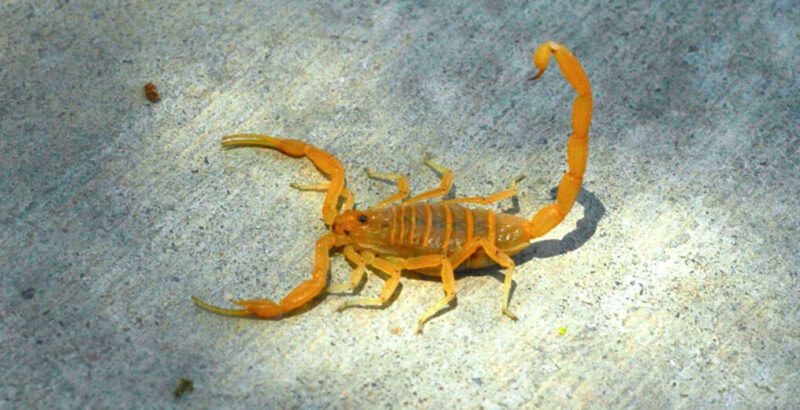Scorpion Pressure Is On the Rise This Spring
As temperatures across Arizona, southern Nevada and California spike, so is scorpion activity. With an abundance of new insect prey – another offshoot of the increase in temperatures – these nocturnal hunters are on the prowl.
Dan Scott, B.C.E, a regional entomologist with Sprague, says even though commercial property owners and managers may not see scorpion activity during traditional business hours, they can still be present around the property.
“Like other arthropods, scorpions will seek a cooler place to shelter during the warmer daylight hours such as cracks and crevices, under slabs, in overgrown landscape or under equipment or shipping pallets,” says Scott.

Even if they are only temporary visitors, scorpions can present a potentially frightening sight to an unsuspecting hotel guest, employee sitting at their desk or outdoor diner.
Scott says scorpions typically don’t establish nesting sites inside buildings and often come inside by accident or to get out of the heat. Even if they are only temporary visitors, they can present a potentially frightening sight to an unsuspecting hotel guest, employee sitting at their desk or outdoor diner.
Meet the Scorpions
While more than 50 varied scorpion species call Arizona, southern Nevada and California home, there are three dominant species – bark scorpion, Arizona hairy scorpion and striped tail scorpion. It should be noted that scorpions do have an extended range with reported encounters in Utah, and eastern Oregon and Washington.
A scorpion’s most prominent feature is the stinger at end of its tail. The stinger is used to neutralize and capture food sources. In an odd twist Scott says scorpions will limit the use of their stingers and instead jump on top of their prey to subdue it and eat it alive. They do this to ration the venom in stinger since it can take two weeks to regenerate.
All scorpions are venomous and except for the bark spider, their venom is considered mild, but if you are stung pain and swelling will occur.
Bark Scorpion – The most venomous scorpion in the U.S., bark scorpions are 1 to 1.5 inches in length and are attracted to moist, humid areas. Bark scorpions are not quick to attack and will sting humans and animals it considers a threat. If you are stung seek medical attention immediately.
Arizona Hairy Scorpion – The largest of the scorpion species in the U.S. – adults can grow to 5 inches in length – this scorpion readily preys on other scorpions, most insects, and even small lizards and snakes. This species prefers to create deep burrows to hide in, some as deep as 8 inches.
Striped Tail Scorpion – One of the most encountered species of scorpion, adults can be up to 3 inches in length. Like the Arizona hairy scorpion, they will nest in the soil but in shallower burrows. They are extremely sensitive to water and humidity so they will be found in areas where excess moisture is present.
How Do Scorpions Get Inside
Scorpions are cryptic pests and will not leave many signs of their presence. These wily creatures are impossible to see at night without the aid of a UV blacklight and they only need a 1/16 of an inch to gain entry.
On stucco sided buildings, for example, bark scorpions can enter through the weep screens that are 3 to 4 inches off the ground (Note: Arizona hairy and striped tail scorpions do not exhibit this behavior). From there they get into the wall voids where they have access to the entire structure. Scorpions will also take advantage of gaps in door thresholds, loose window frames, open sliding glass doors and utility pipe penetrations to get inside.
Scorpion Proofing Your Commercial Property
How do you prevent scorpions from gaining access to your commercial property? It starts and ends with exclusion.
Keep outside entry doors closed as much as possible, especially at night. Install door sweeps and repair window, door and ventilation screens. Reduce clutter on the outside of your building and keep landscape plants from being overgrown and providing a place for scorpions to hide.
Discover The Sprague Difference
If you are looking for an innovative pest management service provider for your commercial property, connect with the Sprague pest management experts at 800.272.4988.

